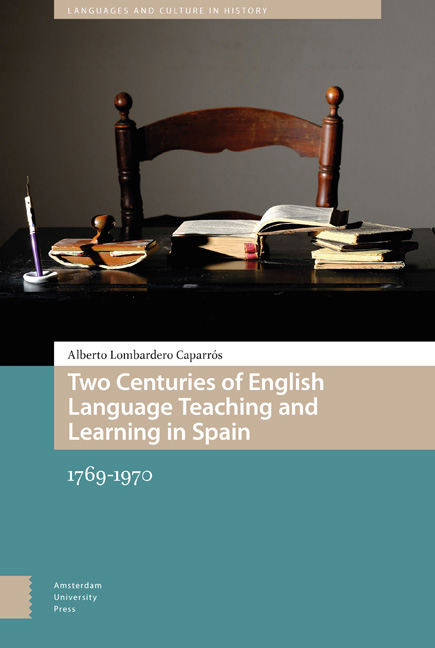3 - ELT in Spain Between 1910 and 1970
Published online by Cambridge University Press: 21 November 2020
Summary
Abstract
Our final chapter surveys six decades of English language teaching and learning between 1910 and 1970, just when it was succeeding French as the world's lingua franca. This period marks the consolidation of the presence of English at all levels of formal education in Spain, especially as we approach the end date of this study.
Due to the evolution of the social sciences in general in the twentieth century, and of linguistics in particular, ELT became the object of scientific debate as never before. The chapter surveys official legislation, authors and their manuals and some theoretical works produced in Spain, not to mention the major contributions on the scientific study of English as a second language coming both from the United States and Great Britain.
Keywords: XX century, ELT, Spain, Harold Palmer, Charles C. Fries
Introduction
We started off this long journey when the First Industrial Revolution and the Enlightenment were both ushering in a new era of inventions, social change, and the beginnings of free, universal state-run education across Europe. Each country adapted to those new paradigms in different ways. Southern European countries had largely based their economy on the agricultural and fishing industries and, with the exception of some Northern provinces, had hardly developed any manufacturing industries. The European struggle for power between conservatives or traditionalists, on the one hand, and liberals or French Revolution supporters on the other, dominated the nineteenth century. In Spain, four civil wars between 1833 and 1868 – known as the Guerras Carlistas (Carlist Wars) – had brought the country to bankruptcy several times, thus preventing it from achieving steady economic growth supported by well-funded education. Spanish state affairs worsened even further with the Hispano-American War in 1898, which dealt a huge blow to Spanish external affairs with the subsequent loss of their last South American colonies. In international affairs, the Berlin Conference of 1884-1885, also known as the West Africa Conference, had alienated Spain from the colonisation of Africa, which was another hard blow to Spanish aspirations to keep up with other European powers on the geopolitical chessboard.
Socially speaking, our last period is characterised by the emergence of many ‘-isms’, both in politics (socialism, communism, fascism) and in the arts (modernism, expressionism, cubism). The Second Industrial Revolution was under way, this time introducing most southern European countries to some degree of technological warfare.
- Type
- Chapter
- Information
- Two Centuries of English Language Teaching and Learning in Spain1769–1970, pp. 111 - 158Publisher: Amsterdam University PressPrint publication year: 2019



